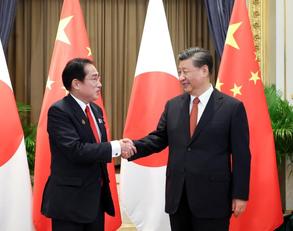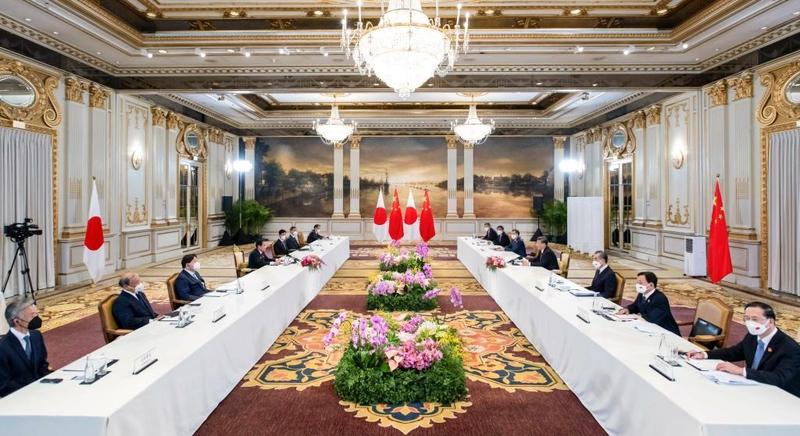 President Xi Jinping and Japanese Prime Minister Fumio Kishida shake hands as they meet on the sidelines of the 29th Asia-Pacific Economic Cooperation Economic Leaders' Meeting in Bangkok, Thailand, Nov 17, 2022. (PHOTO / XINHUA)
President Xi Jinping and Japanese Prime Minister Fumio Kishida shake hands as they meet on the sidelines of the 29th Asia-Pacific Economic Cooperation Economic Leaders' Meeting in Bangkok, Thailand, Nov 17, 2022. (PHOTO / XINHUA)
BEIJING/TOKYO – The first in-person meeting between the leaders of China and Japan in three years shows the positive sign of development of bilateral ties, but the key to develop this relationship still depends on Japan's concrete implementation of consensuses reached between the two sides, observers said.
They made the remark after President Xi Jinping met on Thursday with Japanese Prime Minister Fumio Kishida in Bangkok, Thailand on the sidelines of the 29th Asia-Pacific Economic Cooperation Economic Leaders' Meeting.
READ MORE: Xi calls for building China-Japan relationship fit for new era
Following the bilateral meeting, the two countries also reached a five-point consensus in which they pledged joint efforts to build a stable and constructive China-Japan relationship fit for the new era.
China is not only the largest factory in the world, but also the largest market in the world. Abandoning or underestimating economic cooperation with China will mean the loss of opportunities for any country, including Japan.
Erbiao Dai, President, Asian Growth Research Institute
The consensus includes intensifying high-level interactions, holding a new round of the China-Japan High-level Economic Dialogue at an early date, facilitating people-to-people exchanges and opening a direct telephone line of the maritime and aerial liaison mechanism under their defense departments at an early date.
Being the world's second-largest and third-largest economies, the China-Japan relationship is of great importance for the two close neighbors themselves, and also has an impact on the region and the whole world, said Lyu Yaodong, a research fellow at the Institute of Japanese Studies at the Chinese Academy of Social Sciences.
Lyu said the two countries are highly interdependent in terms of trade and economy, and there still remain several areas for bilateral cooperation. For example, the two sides should deepen the implementation of the Regional Comprehensive Economic Partnership.
The regional free trade pact, which came into force on Jan 1, marked the establishment of a free trade agreement between China and Japan for the first time.
The Ministry of Commerce said China has been Japan's largest trading partner for 15 consecutive years, with two-way trade volume reaching $371.4 billion last year. And Japan's accumulated investment in China exceeds $120 billion.
"These deep economic links make the Japanese business community an important voice regarding China policy, and that voice has been quietly pressing for greater stability in bilateral ties," Christopher B. Johnstone, the Japan Chair at the Center for Strategic and International Studies, wrote in a commentary.
Erbiao Dai, president of the Asian Growth Research Institute in Fukuoka, Japan, said Sino-Japanese cooperation is an important guarantee in promoting the stable development of the Asia-Pacific region.
"China is not only the largest factory in the world, but also the largest market in the world. Abandoning or underestimating economic cooperation with China will mean the loss of opportunities for any country, including Japan," Dai said.
ALSO READ: China, Japan enjoy fruits of cooperation
During the two leaders' meeting, Xi also emphasized that the two sides need to abide by the principles of the four China-Japan political documents and translate into policies the political consensus that the two countries should "be partners, not threats".
 President Xi Jinping meets with Japanese Prime Minister Fumio Kishida in Bangkok, Thailand, Nov 17, 2022. (PHOTO / XINHUA)
President Xi Jinping meets with Japanese Prime Minister Fumio Kishida in Bangkok, Thailand, Nov 17, 2022. (PHOTO / XINHUA)
Major issues of principle such as history and Taiwan bear on the political foundation and basic trust in China-Japan relations, and therefore must be handled in good faith and appropriately, Xi said, adding that China does not interfere in other countries' internal affairs, nor does it accept any excuse by anyone to interfere in its internal affairs.
"The four China-Japan political documents have served as the political foundation that guarantees the development of the China-Japan relationship over the years. As we can see, difficulties suffered by bilateral ties were caused by deviations from the documents," said Lyu.
The four documents, including the China-Japan Joint Statement signed in 1972, have reached a number of important common understandings that have defined the general direction of the China-Japan relationship. And commitments to the documents were reiterated in a four-point principled agreement reached between the two countries in 2014.


